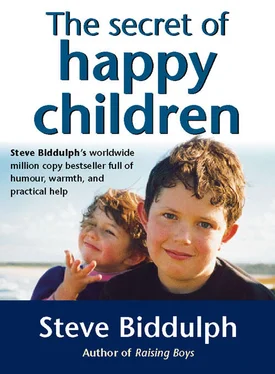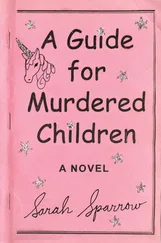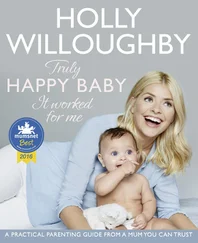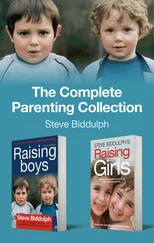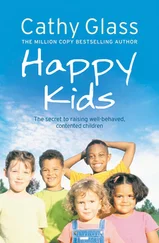Because of this, our children may live in a situation where day-to-day messages are fairly vague and indirect: ‘Now don’t do that, darling, come along’, ‘There’s a good boy’. Both positive and negative messages are casual and not great in their impact.
Then, one day, when life has really overloaded Mum or Dad, there comes a powerful outburst, ‘You little brat, I wish you’d shut up’, anchored with wild eyes, sudden, close proximity, never-before-heard volume and a sense of quivering lack of control that is quite unforgettable. The message is inescapable, although untrue: this is what Mum or Dad really thinks of me!
The words that overwrought parents choose at these times can be remarkably strong.
‘I wish you’d never been born.’
‘You’re a stupid, stupid child.’
‘You’re killing me, do you hear?’
‘I’d like to throttle you!’
It’s not bad to get angry at or around children. On the contrary, children need to learn that one can be angry and discharge tension and be heard, in safety. Elizabeth Kubler Ross says that real anger lasts 20 seconds and is mostly noise. The problem comes when the positive messages (‘You are great’, ‘We love you’, ‘We’ll look after you’) are not equally strong or reliable. Often, although we feel these, we do not communicate them.
Almost every child is dearly loved, but many children do not know this fact; many adults will go to their death still believing that they were a nuisance and a disappointment to their parents. It is one of the most moving moments in family therapy to be able to clear away this mis-understanding.
At the times when a child’s life goes shaky – when a new baby is brought home, when a marriage breaks up, when failure occurs at school, when there is no work for a hopeful teenager – it is important to give positive messages, anchored with a hand on a shoulder and a clear look in the eye: whatever happens, you are special and important to us. We know you’re great.
So far we’ve talked about the unconscious programming of children to be unhappy adults. There are lots of direct ways too!
When disciplining, use put-downs instead of simple demands.
Use put-downs in a friendly way; say, as a pet-name.
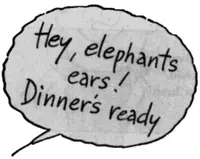
Compare!
Set an example!
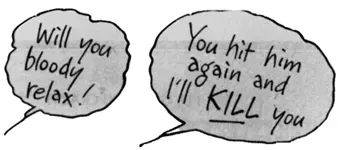
Talk to other people about children’s faults in their hearing.
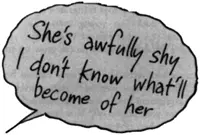
Take pride in patterns that are bound to cause trouble later.
Use guilt to control children.
These sorts of statements can be left out of your parenting repertoire for good. You and they will feel better for it.
I’LL GIVE YOU CRAZY!
Have you ever listened to yourself talking to your kids, and just moaned? A lot of the things we say to kids are, well, crazy! Scots comedian Billy Connolly bemoaned some of these in a recent concert we heard…(you’ll have to imagine the accent).
‘Mum, can I go to the pictures?’ ‘Pictures! I’ll give you pictures.’
‘Can I have some bread then?’ ‘Bread! I’ll bread you my boy!’
Most of us can remember being told things as a child which simply made no sense at all, phrases like: pull your socks up young man…if you don’t come to your senses soon…you’ll smile on the other side of your face!…I’ll teach you to make a fool of me!…and so on. It’s no wonder some people grow up to be a little confused.
I was in a primary school recently where some parents had brought their toddlers to join a new play group. While we were waiting to start, a lively and curious little boy started to pull out some maths equipment from a shelf. His harassed-looking mum told him ‘If you touch that the teacher will cut your fingers off!’ Now any of us can understand the motivation to say this kind of thing – when nothing else works, try terror! But with this kind of message coming thick and fast, what can a child conclude about life? It can only go two ways: either the world is a crazy and dangerous place, or else, it’s no good listening to Mum, she talks a load of rubbish. Now there’s the start of a well adjusted life. We’ve all done it!
One day (true confession) I told my two-year-old son that the police might be cross with him if he didn’t wear his seatbelt. I was hot and tired, and I hate squirming my six-foot-four frame around inside cars to fasten seatbelt buckles on protesting kids. I resorted to a cheap trick, and I paid the price. As soon as the words came out of my mouth I regretted it. For days after I had questions thick and fast. ‘Do the policemen have guns?’, ‘Are there any policemen down this road?’ It was a major job of rehabilitation to get him back to feeling calm, and comfortable about the men and women in blue.
We shouldn’t have to explain everything to our kids, or endlessly reason with them till we are blue in the face. ‘Because I say so’ is a good enough reason some of the time. But there is nothing ever to be gained by needlessly scaring them. ‘When your father gets home…’ ‘You’ll make me so sick I’ll have to go away…’ ‘We’ll put you into a home…’ are the kinds of messages that harm and haunt even tough children. We are their main source of information early on, and later our credibility is put to the test (since they have or will have other sources to compare us with). Our job is to give them a realistic, even slightly rosy picture of the world – which they can build on as they go, and so become hardy and secure on the inside. When they encounter trickiness or dishonesty later in life, they will at least know that this isn’t completely the way of the world, that some people are trustworthy, and safe to be around – Mum and Dad included.
Why do parents put children down?
At this point, you could be feeling guilty about the way that you speak to your own children. Please don’t get these ideas out of perspective. There is a lot that can be done to overcome old programming whether your children are still little or even if they are now adults.
The first step is to begin understanding yourself, to know why put-downs became part of your parenting in the first place. Almost every parent is guilty of unnecessary put-downs from time to time. There are three main reasons for this.
1. You say what was said to you!
You weren’t taught about parenting in school: you had to start from scratch when your children were born and work it out for yourself. But you did have one clear example to work from – your own parents.
I’m sure you’ve found yourself in a heated moment yelling out and then thinking, ‘Good grief, that’s what my parents used to say to me and I hated it!’ Those old tape recordings are your ‘automatic pilot’, however, and it takes presence of mind and practice to react in ways you really prefer.
Some parents, of course, go to the other extreme. With painful memories of the way in which they were raised, they swear never to scold, hit or deprive their own children. The danger here is that they may overdo it, and their children suffer from a lack of control. It isn’t easy, is it?
2. You just thought it was the right thing to do!
Читать дальше
